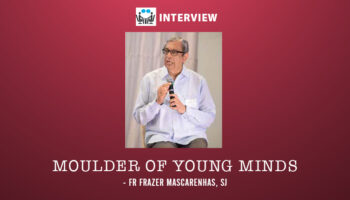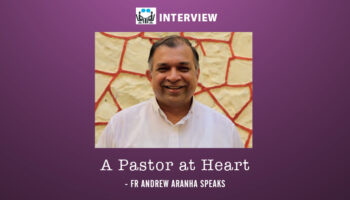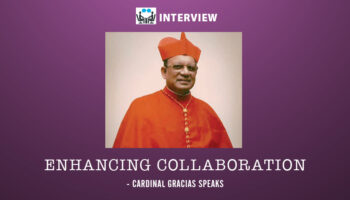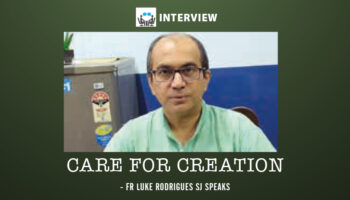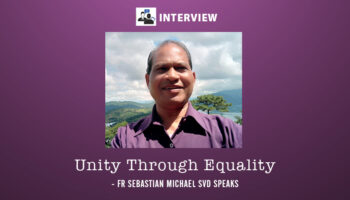A conversation with Brother Philip Pinto CFC, the former Superior General of the Brothers of the Christian Schools.
“A life not reflected on is wasted.” The wisdom of the ancient Greeks is so very apt. I have been invited to share some of my life journey in the hope that others might also take a look at the way their own lives have been moulded by the Spirit flowing through the universe. Nothing happens by chance, and every leaf that falls fulfills a purpose.
Tell us something about your personal journey of growth and of faith—significant people and experiences that have molded you.
There have been some very strong influences in my life. The first was my mother. She was a Parsee who became a Catholic shortly before her marriage to my father. In those days such inter-religious marriages were not viewed favourably, and both families disowned them. While bridges were mended before long and relations re-established, I can imagine the loneliness the young couple felt and how they had to rely on each other.
One of the results of that early time was a recognition that religion and God might not always be on the same page. I grew up recognizing that God was greater than religion, that God was larger than any religion and even than all religions put together.
The second great influence in my life was an Irish Brother who has guided me from my novitiate days. He was the one who taught me how to read the Scriptures. He was a mystic and one who had set out very deliberately on the mystical path as a young Brother. The mystical path is not an easy one, because one has to be faithful to the life of prayer, particularly when God seems distant. He knew from experience about the different stages on the mystical journey and the rigours of the Dark Night so well described by St. John of the Cross. This Brother taught me how to pray, how to use time in prayer and how to stay at prayer. His wisdom and sanctity have been with me all through my life until his passing a few weeks ago.
Why did you join the Christian Brothers? What does it mean for you to be a Brother, and a member of the Christian Brothers?
I grew up in Delhi and went to the Christian Brother School, St. Columba’s, in the Capital. I have no rational explanation as to why I joined this group of men. But I do know why I have stayed with them over the years. It is a choice that is repeatedly made and one which I have never regretted. At the beginning I enjoyed the traditional work of the Brothers: teaching, working in schools with children, training them in games, going on walks or sitting and chatting with them. The innocence and spontaneity of children reveals why Tagore could say that every child comes with a message that God has not despaired of humankind! Children bring hope and constant optimism – necessary ingredients for today’s world, which needs reminding that life is essentially beautiful and worth the effort.
I also gradually realised that being a Brother was about much more than teaching children. It was about discovering what it meant for me to be fully human. I knew that in this way of life I would be able to follow the path of discipleship advocated by Jesus. Being a Brother allowed me to become the type of person God wanted me to become. People ask me why I never went on to be a priest, and I say, “then I wouldn’t have been able to be a Brother!” More than ever before the human race needs brothers and sisters – an egalitarian relationship. It is a prophetic challenge to patriarchy and hierarchy.
You were an educator, then a provincial and later superior general. What would you like to tell educators in India today?
When I look at the numbers of private schools mushrooming all over the country, I realise that education has become so highly commercialized. Recently the schools in the city here had admissions for the Kindergarten Class. I saw parents running along to fulfill the requirements asked for from the different schools. It was not enough to enroll in one school, as admission is not guaranteed. It is actually a lottery! Years back schools managed by religious congregations were sorely needed and were great opportunities for our Catholic children to make their way in life. The children got a good education and also grounding in their faith. I am not sure if that is the main reason religious congregations run schools today. It pains me to see the arrogance and high-handedness of principals, the way staff is treated, and the very dubious standards and practices in many of our institutions.
I believe that a Catholic School is one in which the whole school community – children, staff, parents –is encouraged to experience God the way that Jesus experienced God. Is that happening? Are our schools actually communities of growth? In what ways is the search for God at the centre of our educational enterprise? Do we have to have our Brothers, Sisters and Priests as principals in our schools – particularly when we have more competent lay people available? These are questions that need serious airing and discussion.
What are the main strengths you see in organized religious life today? What weaknesses? What would you like to tell religious superiors today?
In the early 90s, at one of the annual assemblies of the Conference of Religious in India, I recall saying that Religious Life as we had known it was dying. I do not believe that many in the audience thought it was true. Well, nothing in the interim has made me change my mind. I truly hold that the form of religious life that I was brought up on is a thing of the past. I know that in the West it is far more apparent than it is here in India, but the decline is obvious.
We know from the life sciences that when organisms cease to interact with their environment and learn from it, the organism chooses extinction. It is the same with religious life – and indeed with organized religion. As the Internet, social media and other technologies continue to evolve, we religious also need to redefine our traditional ways of relating, our connectivity to other like-minded groups, our institutions and our culture. To ignore this is to court disaster.
So many of our religious leaders are just trying to sustain the present. The change that has overtaken us simply is too much for them and they cannot handle it. New ways of operating in the ministry of leadership is called for. God is at work in our world – as God always is. The problem is that we think the world will always be the way it was, that human beings will continue to live and relate in the same way and that we know what the future will be: a mere extension of the past. But we live in an evolving universe where change is the name of the game. To refuse to change is to seek death.
The task of religious leadership is to hold the vision for the rest of the members. But how many are even conscious of the vision, caught up as they are in the heavy task of maintenance? I deal with so many groups of religious today – wonderful people, strong and generous. But they are, for the most part, caught up in maintaining the past.
The new forms of religious life will only evolve in the actual seeking for today’s God, in new forms of relating in community, in new ways of collaboration and connection in ministry, and in a commitment to walking the road to Jerusalem keeping alive the “dangerous memory of Jesus.”
I believe that we are being called to a new fidelity to the contemplative vision of life. So many of our religious brothers and sisters want to pray, but they do not know how to do it. Our structures encourage the saying of prayers, the practice of devotions, the attendance at rituals and the fidelity to many practices that are ‘part of our heritage’. But we need to really pray once more, not just say prayers. That is why so much of our life is superficial. I see this in my own life, that of my Brothers and in much of religious life in the country. We need to commit to this search for God in a very real and sincere way. And we need help in doing so.
What should be our priorities in the coming decades? Any striking experiences or initiatives that we can all learn from? What are the most pressing issues facing humankind today? What answers are the church and members of religious congregations offering to these challenges?
“The third millennium will be dominated by the ‘religion/spirituality paradox’: the decline of organized religion on one hand coupled with a growing interest in spirituality and wisdom on the other. . . . This demands a reordering of priorities in terms of the spiritual, and an urgent need for a relevant faith. . . . By relevant, I mean a faith that speaks to the current and future concerns of our time.”
“The devastation taking place cannot be critiqued effectively from within the traditional religions or humanist ethics. We find ourselves ethically destitute just when, for the first time, we are faced with ultimacy, the irreversible closing down of the Earth’s functioning in its major life systems. Our ethical traditions know how to deal with suicide, homicide, and even genocide; but these traditions collapse entirely when confronted with biocide, the extinction of the vulnerable life systems of the Earth, and geocide, the devastation of the Earth itself. . . . The human is at a cultural impasse. . . . Radical new forms are needed.
Caleb Rosado, ‘What Is Spirituality?’
Thomas Berry, ‘The Great Work: Our Way Into the Future’
These two quotations are for me the great priorities for religious life in the coming decades. These are also the most pressing issues for humanity today. In a sense, Pope Francis is drawing attention to the plight of the planet and to the inadequacies of the present human mindset to deal with it. His first encyclical, Evangelii Gaudium, clearly speaks about the inherent deficiencies in our modern culture: the economy of exclusion, the worship of money, and the growing inequality which gives birth to violence. All these work against the wellbeing of our planet, the only home we have. In Laudato Si, the Pope makes a passioned appeal to make care of the Earth a central issue in our lives and ministries. Theology that does not take this into account is irrelevant to our world today. In India we are continuing with our traditional ministries, ignoring this great threat to our future. With the installation of Donald Trump as the 45th American President, the threat is magnified and we can no longer sit on the fence. Ignorance is not an excuse. I love the words of the poet Drew Dillinger:
It’s 3.23 in the morning, and I’m awake,
Because my great, great, grandchildren
Won’t let me sleep.
My great, great, grandchildren ask me in dreams,
what did you do while the planet was plundered?
what did you do when the earth was unraveling?
surely you did something
when the seasons started failing?
as the mammals, reptiles, birds were all dying?
did you fill the streets with protest
when democracy was stolen?
what did you do
once
you
knew?…..
Drew Dillinger, Hieroglyphic Stairway
The day of individual salvation is long gone. I am not saved alone. My salvation is interwoven in the salvation of all species of my planet – the human being but one. The very word salvation is far greater than being forgiven for my sins or reaching heaven in the next life!!!
At the moment there are only isolated attempts by some individual religious and lay groups in this direction. The Indian Church has a vast road to traverse, and to my thinking it is not even aware of the journey.
Conclusion
Finally, I am an optimist. From the above you might think I hold little hope for our Church or world or Religious Life. On the contrary. I am fully convinced that the Spirit of God permeates our Universe and is actively creating the future. I am also convinced that there are enough men and women who think differently, who are slowly being the leaven in the dough. The leaven, as in Jesus’s parable, “contaminates” the whole dough and makes it rise. These men and women are spreading the message of a new face of God alive in our world, inviting people to a fresh release of Spirit for a vibrant and exciting future. May this corruption thrive!
– Brother Philip Pinto CFC was a principal, provincial and then general of his religious order. After completing his term, he returned to India, and is actively engaged in on-going formation programmes and other animation services for religious.
To subscribe to the magazine Contact Us

